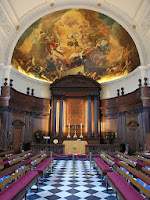 |
| Chapel of the Royal Hospital, Chelsea |
William Vann, already making a name for himself as a pianist and accompanist, wore a different hat and in his role as director of music at the Royal Hospital conducted the chapel's own choir. the 16 strong group of young professional singers were accompanied by the Wren Orchestra leader Oliver Webber, performing on period instrument.
They opened with a rousing performance of Zadok the Priest, showing that with strongly focussed tone, clean attack and crisp rhythms, you do not need huge forces to create an effect with this wonderful piece. Vann's speeds were lithe without being too rushed, and the performance had admirably wiry strength to it.
They followed this with a group of instrumental pieces from the music for the Royal Fireworks, aptly chosen given the date. The orchestra provided crisp lively performances with some nice solo moments.
In a spoken introduction Vann admitted that they were performing the traditional version of Handel's Israel in Egypt (without Handel's original part one) purely because of time constraints. This means that the oratorio starts rather awkwardly with a recitative. But Peter Morton's beautifully flexible account of the recit soon drew us in.
Israel in Egypt is a famous choral show case, many of the choruses are for double choir, and there are few solos in the first half. Instead Handel presents a stunning series of choruses depicting the various plagues inflicted on the Egyptians. Numbering just 16 singers, in the double choruses this meant just two singers to a part, but such was the discipline and technical facility of the singers that we did not notice the lack of singers. In fact, it was quite the contrary as the smaller forces enabled Vann to create a highly fleet and mobile performance. The result was a vividly involving sequence of choruses with some superb descriptions of the plagues. The performers clearly relished Handels vividly imaginative writing and the choir combined characterful performance with some finely focussed singing.
The solos in this oratorio are a problem, if you engage soloists then they are rather under utilised, whereas if you use choir members then you run the risk of under characterised solos by essentially choral singers. At the Royal Hospital the various solos were allocated to members of the choir, who each took turns so that by the end of the evening we had heard 13 of the 16 singers in solo moments. Each contributed highly characterful and technically accomplished singing, and we certainly had no under-characterised performances by white voices. Quite remarkably the singers in the choir seem to be able to move between characterful solo singing and finely blended choral tones. It is unfair to single out particular singers as all impressed but Eloise Irving and Helen Ashby were beautifully balanced in the soprano duet The Lord is my strength, each shaping the music finely; Thomas Stoddart and Timothy Murphy were the soloists in the bass duet The Lord is a man of war, giving us some fine singing and refraining from the temptation to bluster; Tenor Edward Hughes gave a dramatically committed account of The enemy said, I will pursue. Soprano brought Leah Jackson brought the evening to a poised conclusion as she led the choir in the final Sing ye to the Lord.
The bench pews in the Royal Hospital chapel are not the most comfortable of seats, so that by the end of the evening I was glad that Vann had chosen to perform the shorter traditional version of Israel in Egypt. This was a marvellously involving performance. We were sitting pretty close to the choir, so I can testify to the very real commitment and vivacity which they brought to the performance.
Elsewhere on this blog:
- WIN a copy of Music: The Definitive History our latest Competition
- Lily Afshar and the Collaborative Orchestra
- Sheer delight - Gallay horn trios and quartet - CD review
- Sweet indeed - Douce France - Anne Sofie von Otter - CD review
- Mesmerising and Magical - Breaking the Rules - BREMF
- 40th Birthday - Tallis Scholars in Taverners Missa Gloria Tibi Trinitas - CD review
- Music and Murder - Passion and the Princess - Musica Secreta at BREMF
- We take a second, longer look at Les Vepres Siciliennes at Covent Garden
- Imaginative programme - Francesco Meli in Liszt and Britten - CD review
- Vibrant and involving - Ashley Riches and Elizabeth Watts - London Song Festival
- Birth of the Symphony - Academy of Ancient Music - CD review
- Birthday celebration - Howard Blake & Benedict Kloeckner
- Home






%20TallWall%20Media_Oxford%20Song.jpg)
%20TallWall%20Media_Oxford%20Song.jpg)
%20TallWall%20Media_Oxford%20Song.jpg)


No comments:
Post a Comment